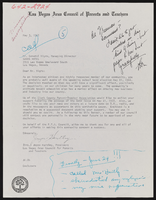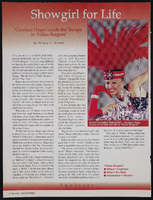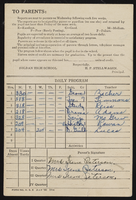Search the Special Collections and Archives Portal
Search Results
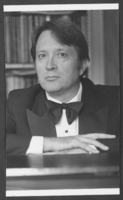
Photograph of Virko Baley, Las Vegas, August 30, 1979
Date
Archival Collection
Description
Image
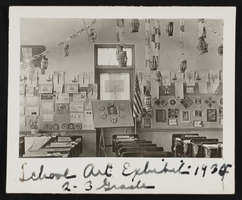
Classroom with student art on walls and ceiling: photographic print
Date
Archival Collection
Description
Image

Photograph of Dr. George R. Carpenter, University of Nevada, Las Vegas, 1972
Date
Archival Collection
Description
Image
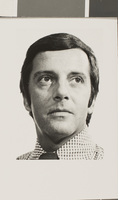
Photograph of Michael James, University of Nevada, Las Vegas, 1973
Date
Archival Collection
Description
A portrait of Michael James, the Program Development Specialist for Teacher Corps Program, lecturer, and member of the Department of Elementary Education at the University of Nevada, Las Vegas (UNLV).
Image
Series I. Committees, Senates, and Associations, 1964-1984
Level of Description
Scope and Contents
The Committees, Senates, and Associations series consists of meeting minutes, communication, and memoranda relating to Dr. Charles Adams's work on different committees, senates, and associations from 1964 to 1984. Committees, senates, and associations of particular interest in this series include Nevada Southern University (NSU) Graduate Council meeting minutes, NSU Academic Council, NSU Faculty Reorganization Committee, the University of Nevada, Las Vegas (UNLV) Faculty Senate meeting minutes, the Southern Nevada Teachers of English, and the Nevada Faculty Alliance.
Archival Collection
Collection Name: Dr. Charles L. Adams Graduate Studies and Department of English Records
Box/Folder: N/A
Archival Component
Hannah Werner oral history interview, 2024 August 30
Level of Description
Scope and Contents
Oral history interview with Hannah Werner conducted by Claytee D. White and Stefani Evans on August 30, 2024 for the UNLV Remembers: an Oral History of the 6 December 2023 Shootings project. In this interview, Werner, a junior in UNLV's Film School, recalls leaving her dorm and heading to class in Flora Dungan Humanities building at 11:30am. Shortly after class began, she and her classmates started receiving the University Police Department (UPD) active shooter texts. The class decided to remain in place, stacking desks against the door and turning off the lights. Hebbler suggested the students call their families. Werner was talking to her father when she heard gunshots. When the building was being evacuated, they heard banging on the door and loud voices. Realizing it was the police, Werner put on her backpack backwards, and when they opened the door were faced with guns. The class was evacuated about 3:00pm around the building and out the stairs facing Maryland Parkway. Werner started filming as they were being evacuated, sent her film to the networks, and was later interviewed by CBS News. Her dad, a Spanish teacher, was waiting for her near some nearby apartments, and they took a classmate home on their way home that night. Her class met in video calls every night over the next few weeks; Werner is still close with all her classmates. Werner, a substitute teacher, says the event has made substituting harder, is more aware of her surroundings and emergency exits, and looks to Hebbler as a role model for the way he remained calm and kept his students calm. Digital audio and transcript available.
Archival Collection
Collection Name: UNLV Remembers: an Oral History of the 6 December 2023 Shooting interviews
Box/Folder: Digital File 00 (Restrictions apply)
Archival Component

